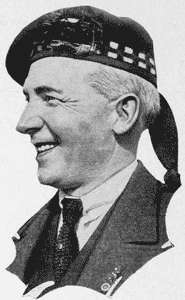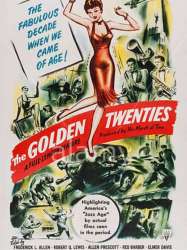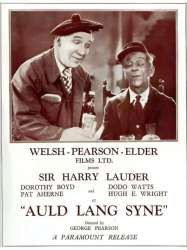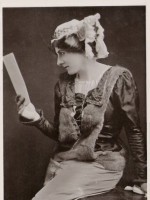Harry Lauder est un Acteur Britannique né le 4 aout 1870

Sir Henry "Harry" Lauder (/ˈlɔːdər/; 4 August 1870 – 26 February 1950) was a Scottish music hall and vaudeville theatre singer and comedian. He was perhaps best known for his long-standing hit "I Love a Lassie" and for his international success. He was described by Sir Winston Churchill as "Scotland's greatest ever ambassador!" He became a familiar world-wide figure promoting images like the kilt and the cromach to huge acclaim, especially in America. Other songs followed, including "Roamin' in the Gloamin", "A Wee Deoch-an-Doris", and "The End of the Road".
By 1911, Lauder had become the highest-paid performer in the world, and was the first Scottish artist to sell a million records. He raised vast amounts of money for the war effort during World War I, for which he was subsequently knighted in 1919. He went into semi-retirement in the mid-1930s, but briefly emerged to entertain troops in World War II. By the late-1940s he was suffering from long periods of ill-health and died in Scotland in 1950.
Lauder was born in his maternal grandfather's house in Bridge Street Portobello, Edinburgh, the eldest of seven children to John Lauder, a Master Potter, and his wife Isabella Urquhart Macleod née McLennan. John Lauder, was a descendent of Lauders of the Bass, and Isabella was born in Arbroath to a family from the Black Isle. Lauder's father moved to Newbold, Derbyshire in early 1882 to take up a job designing china, but died of pneumonia on April 20. Upon his death, Isabella, left short of money (the £15 Life Assurance Policy of her husband not going far), moved the family to Arbroath. Education beyond the age of 11 then requiring payment, Harry worked part-time at the local flax mill to fund that. In 1884 the family moved to live with Harry's maternal uncle, Alexander McLennan, in Hamilton, South Lanarkshire, where his uncle found him employment at Eddlewood Colliery at a weekly wage of ten shillings, a job which he maintained for the next decade.
Marriage and early career
On 19 June 1891, at age 21, Lauder married Ann, daughter of James Vallance, a colliery manager in Hamilton and his wife Mary née Kerr. Lauder often sang to the miners in Hamilton who encouraged him to perform in local music halls. While singing in nearby Larkhall, he received 5 shillings—the first time he was paid for singing. He received further engagements including a weekly "go-as-you please" night held by Mrs. Christina Baylis at her Scotia Music Hall/Metropole Theatre in Glasgow. She advised him to gain experience by touring music halls around the country with a concert party, which he did. The tour allowed him to quit the coal mines and become a professional singer. Lauder concentrated his repertoire on comedic and songs of Scotland and Ireland.
By 1894 he had turned professional and performed local characterisations at small, Scottish and northern English music halls, but had ceased the repertoire by 1900. In March of that year, Lauder travelled to London and reduced the heavy dialect of his act which according to a biographer, Dave Russell, "handicapped Scottish performers in the metropolis". He was an immediate success at the Charing Cross Music Hall and the London Pavilion, venues at which the theatrical paper The Era thought he generated "[a] great furore" among his audiences with three of his self-composed songs. It was during this time that he became a Freemason. He was initiated on 28 January 1897 in Lodge Dramatic, No.571. He remained an active Freemason for the rest of his adult life.
Career peak years; 1900–1920
In 1905 Lauder's success in leading the Howard & Wyndham pantomime at the Theatre Royal, Glasgow, for which he wrote I Love a Lassie, made him a national star, and he obtained contracts with Sir Edward Moss and others. Lauder then made a switch from music hall to variety theatre and undertook a tour of America in 1907. The following year, he performed a private show before Edward VII at Sandringham, and in 1911, he again toured the United States where he commanded $1,000 a night. In 1912, he was top of the bill at Britain's first ever Royal Command Performance, in front of King George V, organised by Alfred Butt. Lauder undertook a world tour extensively during his forty-year career, including 22 trips to the United States—for which he had his own railroad train, the Harry Lauder Special, and made several trips to Australia, where his brother John had emigrated. Lauder was, at one time, the highest-paid performer in the world, making the equivalent of £12,700 a night plus expenses, He was paid £1125 for an engagement at the Glasgow Pavilion Theatre in 1913 and was later considered by the press to earn one of the highest weekly salaries by a theatrical performer during the pre-war period. During the First World War Lauder promoted recruitment into the services and starred in many concerts for troops at home and on the western front. His entertainment activities were made poignant by the death in action of his son at the end of 1916.
The Great War
When World War I broke out, Lauder was in Melbourne on one of his Australian tours. During this war, he led successful fundraising efforts for war charities, organised a tour of music halls in 1915 for recruitment purposes, and brought his piano to the front lines where he entertained troops in France. Through his efforts in organising concerts and fundraising appeals he established the charity, the Harry Lauder Million Pound Fund, for maimed Scottish soldiers and sailors to help servicemen return to health and civilian life, and for these many services he was knighted in March 1919.
Lauder felt very impassioned about the war. In 1915 he wrote "I know that I am voicing the sentiment of thousands and thousands of people when I say that we must retaliate in every possible way regardless of cost. If these German savages want savagery, let them have it".
He suffered personal tragedy during the war, when his only son, John, a Cambridge University-educated Captain in the 8th Argyll and Sutherland Highlanders, was killed in action on 28 December 1916 at Pozières. Harry wrote the song "The End of the Road" in the wake of John's death (published as a collaboration with the American William Dillon, 1924). He had a monument for his son erected in the little private Lauder cemetery in Glenbranter (John Lauder was buried in the war cemetery at Ovillers in France).
Winston Churchill stated that Lauder, "... by his inspiring songs and valiant life, rendered measureless service to the Scottish race and to the British Empire."
Later years
Lady Lauder died on 31 July 1927 and was buried next to her son John's memorial at Glenbranter, Argyll, alongside her parents. Sir Harry's niece, Margaret Lauder, MBE (1900–1966), now moved in with him at his home, Laudervale (outside Dunoon), to become his secretary & companion. She would be the lady of the house and care for him in his twilight years.
After The Great War Sir Harry Lauder continued to tour the now declining variety theatre circuits until his final tour in North America in 1932. He was semi-retired in the mid-1930s, until his final retirement was announced in 1935. However, he again entertained troops throughout Britain during World War II, despite his age, and made wireless broadcasts with the BBC Scottish Symphony Orchestra. He also appeared immediately after the war to thank the crews of American food relief ships docking at Glasgow.
Lauder's understanding of life, its pathos and joys, endeared him to all. Beniamino Gigli and others commended his singing voice and clarity. Lauder usually performed in full 'Highland' regalia—Kilt, Sporran, Tam o' Shanter, and twisted walking stick—singing Scottish-themed songs (Roamin' in the Gloamin' etc.). On the negative side, this 'Romantic' image of the ever-bekilted 'music-hall' Scotsman helped foster an image of Scotland that was not always flattering and even lent itself to some ridicule. Likewise, his penchant for telling stories and jokes involving the alleged parsimony of the Scots established an enduring but completely false image of his fellow countrymen. Some of the most generous philanthropists of the age, such as Andrew Carnegie and, before him, David Dale, were Scots, giving the lie to the theatrical Lauder version.
Source : Wikidata
Harry Lauder

Nom de naissance Henry Lauder
Nationalité Royaume-uni
Naissance 4 aout 1870
Mort 26 février 1950 (à 79 ans)
Nationalité Royaume-uni
Naissance 4 aout 1870
Mort 26 février 1950 (à 79 ans)
By 1911, Lauder had become the highest-paid performer in the world, and was the first Scottish artist to sell a million records. He raised vast amounts of money for the war effort during World War I, for which he was subsequently knighted in 1919. He went into semi-retirement in the mid-1930s, but briefly emerged to entertain troops in World War II. By the late-1940s he was suffering from long periods of ill-health and died in Scotland in 1950.
Biographie
Early lifeLauder was born in his maternal grandfather's house in Bridge Street Portobello, Edinburgh, the eldest of seven children to John Lauder, a Master Potter, and his wife Isabella Urquhart Macleod née McLennan. John Lauder, was a descendent of Lauders of the Bass, and Isabella was born in Arbroath to a family from the Black Isle. Lauder's father moved to Newbold, Derbyshire in early 1882 to take up a job designing china, but died of pneumonia on April 20. Upon his death, Isabella, left short of money (the £15 Life Assurance Policy of her husband not going far), moved the family to Arbroath. Education beyond the age of 11 then requiring payment, Harry worked part-time at the local flax mill to fund that. In 1884 the family moved to live with Harry's maternal uncle, Alexander McLennan, in Hamilton, South Lanarkshire, where his uncle found him employment at Eddlewood Colliery at a weekly wage of ten shillings, a job which he maintained for the next decade.
Marriage and early career
On 19 June 1891, at age 21, Lauder married Ann, daughter of James Vallance, a colliery manager in Hamilton and his wife Mary née Kerr. Lauder often sang to the miners in Hamilton who encouraged him to perform in local music halls. While singing in nearby Larkhall, he received 5 shillings—the first time he was paid for singing. He received further engagements including a weekly "go-as-you please" night held by Mrs. Christina Baylis at her Scotia Music Hall/Metropole Theatre in Glasgow. She advised him to gain experience by touring music halls around the country with a concert party, which he did. The tour allowed him to quit the coal mines and become a professional singer. Lauder concentrated his repertoire on comedic and songs of Scotland and Ireland.
By 1894 he had turned professional and performed local characterisations at small, Scottish and northern English music halls, but had ceased the repertoire by 1900. In March of that year, Lauder travelled to London and reduced the heavy dialect of his act which according to a biographer, Dave Russell, "handicapped Scottish performers in the metropolis". He was an immediate success at the Charing Cross Music Hall and the London Pavilion, venues at which the theatrical paper The Era thought he generated "[a] great furore" among his audiences with three of his self-composed songs. It was during this time that he became a Freemason. He was initiated on 28 January 1897 in Lodge Dramatic, No.571. He remained an active Freemason for the rest of his adult life.
Career peak years; 1900–1920
In 1905 Lauder's success in leading the Howard & Wyndham pantomime at the Theatre Royal, Glasgow, for which he wrote I Love a Lassie, made him a national star, and he obtained contracts with Sir Edward Moss and others. Lauder then made a switch from music hall to variety theatre and undertook a tour of America in 1907. The following year, he performed a private show before Edward VII at Sandringham, and in 1911, he again toured the United States where he commanded $1,000 a night. In 1912, he was top of the bill at Britain's first ever Royal Command Performance, in front of King George V, organised by Alfred Butt. Lauder undertook a world tour extensively during his forty-year career, including 22 trips to the United States—for which he had his own railroad train, the Harry Lauder Special, and made several trips to Australia, where his brother John had emigrated. Lauder was, at one time, the highest-paid performer in the world, making the equivalent of £12,700 a night plus expenses, He was paid £1125 for an engagement at the Glasgow Pavilion Theatre in 1913 and was later considered by the press to earn one of the highest weekly salaries by a theatrical performer during the pre-war period. During the First World War Lauder promoted recruitment into the services and starred in many concerts for troops at home and on the western front. His entertainment activities were made poignant by the death in action of his son at the end of 1916.
The Great War
When World War I broke out, Lauder was in Melbourne on one of his Australian tours. During this war, he led successful fundraising efforts for war charities, organised a tour of music halls in 1915 for recruitment purposes, and brought his piano to the front lines where he entertained troops in France. Through his efforts in organising concerts and fundraising appeals he established the charity, the Harry Lauder Million Pound Fund, for maimed Scottish soldiers and sailors to help servicemen return to health and civilian life, and for these many services he was knighted in March 1919.
Lauder felt very impassioned about the war. In 1915 he wrote "I know that I am voicing the sentiment of thousands and thousands of people when I say that we must retaliate in every possible way regardless of cost. If these German savages want savagery, let them have it".
He suffered personal tragedy during the war, when his only son, John, a Cambridge University-educated Captain in the 8th Argyll and Sutherland Highlanders, was killed in action on 28 December 1916 at Pozières. Harry wrote the song "The End of the Road" in the wake of John's death (published as a collaboration with the American William Dillon, 1924). He had a monument for his son erected in the little private Lauder cemetery in Glenbranter (John Lauder was buried in the war cemetery at Ovillers in France).
Winston Churchill stated that Lauder, "... by his inspiring songs and valiant life, rendered measureless service to the Scottish race and to the British Empire."
Later years
Lady Lauder died on 31 July 1927 and was buried next to her son John's memorial at Glenbranter, Argyll, alongside her parents. Sir Harry's niece, Margaret Lauder, MBE (1900–1966), now moved in with him at his home, Laudervale (outside Dunoon), to become his secretary & companion. She would be the lady of the house and care for him in his twilight years.
After The Great War Sir Harry Lauder continued to tour the now declining variety theatre circuits until his final tour in North America in 1932. He was semi-retired in the mid-1930s, until his final retirement was announced in 1935. However, he again entertained troops throughout Britain during World War II, despite his age, and made wireless broadcasts with the BBC Scottish Symphony Orchestra. He also appeared immediately after the war to thank the crews of American food relief ships docking at Glasgow.
Lauder's understanding of life, its pathos and joys, endeared him to all. Beniamino Gigli and others commended his singing voice and clarity. Lauder usually performed in full 'Highland' regalia—Kilt, Sporran, Tam o' Shanter, and twisted walking stick—singing Scottish-themed songs (Roamin' in the Gloamin' etc.). On the negative side, this 'Romantic' image of the ever-bekilted 'music-hall' Scotsman helped foster an image of Scotland that was not always flattering and even lent itself to some ridicule. Likewise, his penchant for telling stories and jokes involving the alleged parsimony of the Scots established an enduring but completely false image of his fellow countrymen. Some of the most generous philanthropists of the age, such as Andrew Carnegie and, before him, David Dale, were Scots, giving the lie to the theatrical Lauder version.
Le plus souvent avec
Filmographie de Harry Lauder (4 films)
Acteur

The Golden Twenties (1950)
, 1h8Origine Etats-Unis
Genres Documentaire
Acteurs Charlie Chaplin, Rudolph Valentino, Robert Q. Lewis, John Barrymore, Vilma Bánky, Irving Berlin
Rôle Self (archive footage)
Note65%






The End of the Road (1936)
, 1h12Origine Royaume-uni
Genres Comédie, Musical
Thèmes Musique
Acteurs Harry Lauder, Bruce Seton
Rôle John MacGregor
Note55%





After she marries a drunken wastrel the daughter of the manager of a Scottish concert party is thrown out by him.

Auld Lang Syne (1929)
, 1h15Réalisé par George Pearson
Origine Royaume-uni
Genres Drame, Musical
Thèmes Musique
Acteurs Harry Lauder, Dorothy Boyd, Patrick Aherne
Rôle Sandy McTavish

Huntingtower (1927)
Réalisé par George Pearson
Origine Royaume-uni
Genres Drame, Aventure
Acteurs Harry Lauder, Patrick Aherne, Moore Marriott, Nancy Price
Rôle Dickson McCunn
Note23%





The film is ″(a) tale of chivalry in modern times, involving a Glasgow grocer and a Russian princess imprisoned in a deserted castle″ according to the British Film Institute.
 Connexion
Connexion




